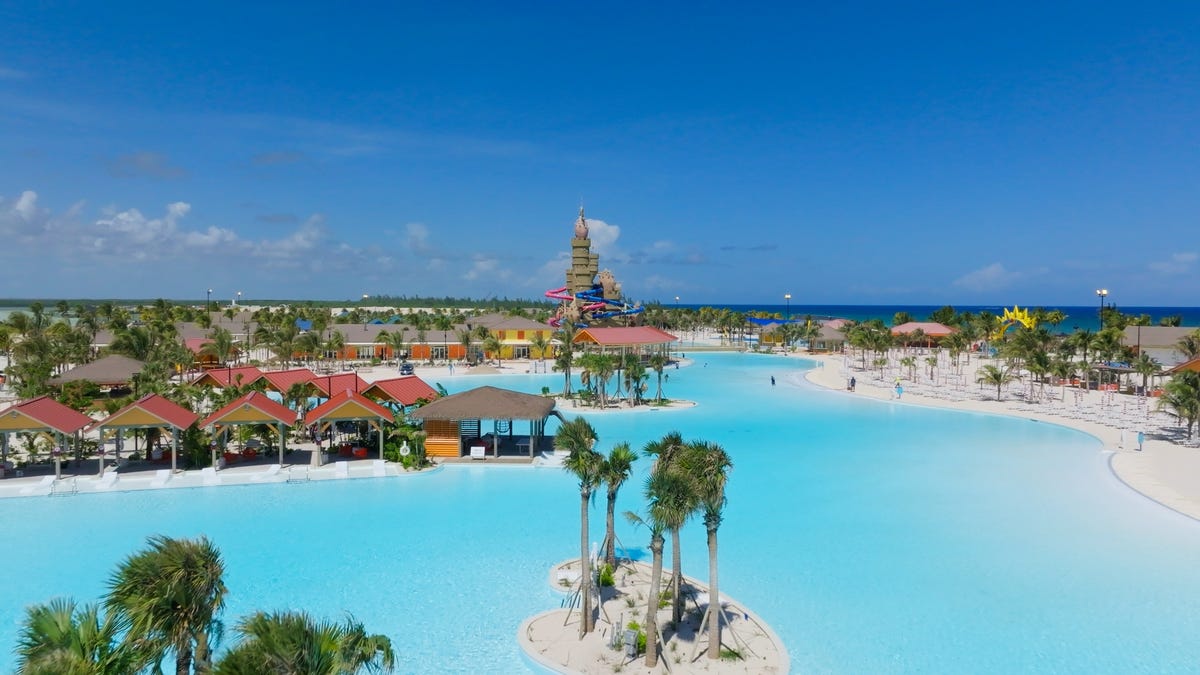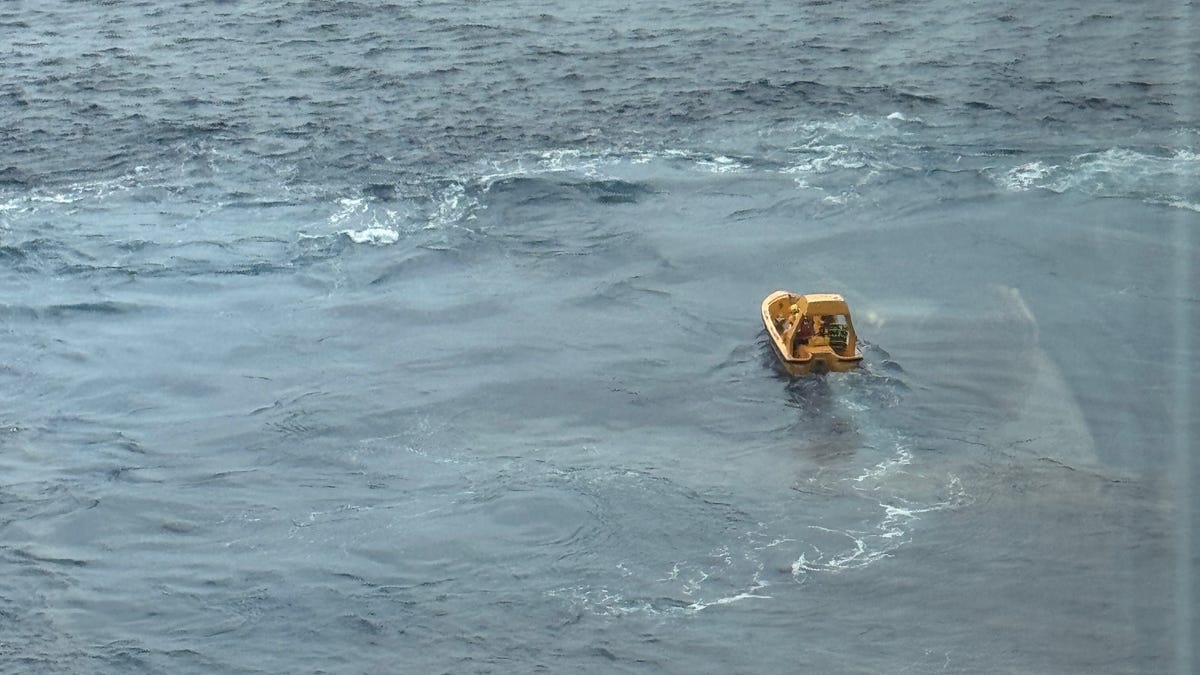
How to find the best price, perks when booking a cruise
Find the cruise that works for your budget with these tips.
Problem Solved
- Cruise lines are heavily investing in private islands to enhance their offerings and control the guest experience.
- These destinations offer exclusive amenities and activities, often for an additional charge, supplementing onboard experiences.
- The Bahamas’ proximity to Florida and government cooperation make it a prime location for these private islands.
During a recent vacation, Jared Huff enjoyed a private island in The Bahamas as his personal playground.
The 20-year-old went jet skiing, visited a waterpark and relaxed on the beach at Royal Caribbean’s Perfect Day at CocoCay for hours before returning to the Wonder of the Seas ship. Huff, who is from Knoxville, Tennessee, was visiting during a June cruise with his girlfriend and her family.
“Even the themes of, like, the slides and the beaches, it just seemed like an extension of the cruise ship, which is kind of a different vibe than other ports and was cool for me to experience,” he told USA TODAY.
The destination offers an exclusive experience packed with activities as part of many Royal Caribbean sailings, and has been a hit with guests. The high seas have long been cruise lines’ primary domain, but many are investing more heavily in land-based destinations to complement their offerings at sea.
A major new competitor to CocoCay, Carnival Cruise Line’s Celebration Key – with five distinct areas or “portals” across 65 acres – will launch later this month on Grand Bahama. Here’s why cruise lines are betting big on private island destinations.
Why are cruise lines leaning into private islands?
Cruise lines have had exclusive destinations for decades, but Royal Caribbean was the first to, “shall we say, put these private islands on steroids,” said Patrick Scholes, a lodging and leisure analyst with Truist Securities. The company’s private island, previously just CocoCay, was relaunched in 2019 following a $250 million renovation.
The destination has water slides, pools, a zip line, cabanas, dining venues and bars, and more. Scholes likened it to a “mini Caribbean” theme park.
“They took a lot of risk and nobody really believed them until they saw it, and lo and behold, it was a real grand slam,” he said.
Royal Caribbean International’s chief marketing officer, Kara Wallace, told USA TODAY in October that of more than 250 ports its ships visit, CocoCay is “the number one highest-rated destination.”
“I think their competitors, that certainly being Carnival … really took a cue from Royal Caribbean and said, ‘Wow, Royal Caribbean really hit a home run and we’re going to try to emulate that,'” Scholes said.
Carnival Corp. told USA TODAY that its Princess Cays destination in the Bahamas, established in 1992, was one of the earliest of its kind in the industry.
“Carnival Corporation’s long and proud history of creating exceptional exclusive destination experiences for guests dates back more than three decades,” the company said in an emailed statement. The cruise line operator has seven destinations in the Caribbean and Mexico, with its flagship brand, Carnival Cruise Line, visiting most frequently.
“Given this, the destinations are being enhanced and will be marketed as the new Paradise Collection by Carnival,” the statement continued.
With more destinations around the world pushing back against overtourism and the potential for geopolitical impacts on itineraries, private islands can offer a more undefined, convenient alternative, according to Marilyn Macallair, a cruise travel analyst for Phocuswright.
“Now private destinations are becoming destinations in themselves,” she said.
Cruise line private island destinations include:
- Castaway Cay in The Bahamas (Disney Cruise Line)
- Disney Lookout Cay at Lighthouse Point in the Bahamas (Disney Cruise Line)
- Great Stirrup Cay in The Bahamas (Norwegian Cruise Line)
- RelaxAway, Half Moon Cay in The Bahamas (Carnival Cruise Line and Holland America Line)
- Harvest Caye in Belize (Norwegian Cruise Line)
- Ocean Cay MSC Marine Reserve in The Bahamas (MSC Cruises)
- Perfect Day at CocoCay in The Bahamas (Royal Caribbean and Celebrity Cruises)
- Princess Cays in The Bahamas (Princess Cruises and Carnival Cruise Line)
What are the benefits of cruise line private islands?
Owning or leasing a destination allows cruise lines to control almost every aspect of the experience, Macallair noted, from which ships stop there and when, to the look of the facilities and the food and drink pricing.
While many activities and amenities are complimentary – and onboard drink packages often still apply – plenty of others come at an upcharge, from excursions to cabana rentals and beach club passes. Admission to CocoCay’s Thrill Waterpark, for example, costs extra, though prices vary by season (booked passengers can check rates for their specific sailing via My Royal Cruise).
The availability of land in The Bahamas and its government’s willingness to work with cruise lines make it a particularly attractive choice, Scholes said. Plus, it’s easy to get to: Bimini, where Virgin Voyages’ The Beach Club at Bimini is located, is just 50 miles from Florida.
Macallair also noted that the Caribbean remains in high demand.
In 2024, 43% of cruise guests visited the region, according to Cruise Lines International Association’s most recent State of the Cruise Industry Report. Nearly 15 million passengers sailed on Caribbean, Bahamas and Bermuda cruises, up from 12.8 million in 2023.
For passengers, Macallair said the exclusivity is part of the appeal. Scholes echoed that, noting it makes that kind of experience relatively accessible, compared to other kinds of trips.
“It’s a really affordable way to go to a private island in the Caribbean for the day, whereas room rates and flights are really, really expensive,” he said.
That highly-managed setting can also be a drawback, though. While cruise lines often integrate local cultural elements – such as Junkanoo at Disney Lookout Cay at Lighthouse Point – some visitors may find they lack the depth of immersion on offer at other ports of call.
“I probably wouldn’t go on a cruise for the sake of going back to CocoCay,” said Huff. “Sure, if it stops there, it’s an enjoyable stop. It’s not something that would keep me from going on a cruise, but I would definitely prefer something more culturally immersive, something that I can go out and actually explore a country and, like, travel a little bit.”
A spokesperson for Royal Caribbean said its “goal is to always amplify the local cultures of the destinations” it visits. They noted that at the line’s upcoming Royal Beach Club Paradise Island, for example, the cruise line will work with local artisans, vendors and suppliers to bring in their products, feature local entertainment like rake-and-scrape musicians, offer Bahamian food alongside American fare and more.
Are cruise lines adding more private islands?
Celebration Key is hardly the only land-based project underway.
- Carnival Cruise Line and Holland America Line recently announced that they would partner on enhancements to the private Bahamas destination Half Moon Cay. The changes, the first of which will be completed by summer 2026, include a new pier where ships can dock on its north side, added lunch venues and bars and a new name, RelaxAway, Half Moon Cay.
- Norwegian Cruise Line Holdings Ltd., parent company of Norwegian, Oceania Cruises and Regent Seven Seas Cruises, will also add a new welcome center, an island-wide tram system, an “extensive” new pool area and more to its Bahamas island, Great Stirrup Cay, the company said in an April news release. The upgrades are set to debut in the fourth quarter of 2025.
- Royal Caribbean has a slew of other land-based products launching over the next few years, too, including Royal Beach Club Paradise Island in December 2025; Royal Beach Club Cozumel in 2026 and Perfect Day Mexico in 2027. The company will also open a destination on the island of Lelepa in Vanuatu in 2027, with more details to come.
- MSC Group is developing an island near its existing Bahamas destination, Ocean Cay MSC Marine Reserve, as well, Travel Weekly reported.
Scholes said there may come a time when the market is oversaturated with suped-up private islands. Given how long they take to develop, however, he said that’s unlikely to happen for at least five years.
“There’s always the fear down the road that you sort of kill the golden goose by just (having) too many,” he said. “We’re not at that point yet.”
This story was updated to add new information.
Nathan Diller is a consumer travel reporter for USA TODAY based in Nashville. You can reach him at ndiller@usatoday.com.







